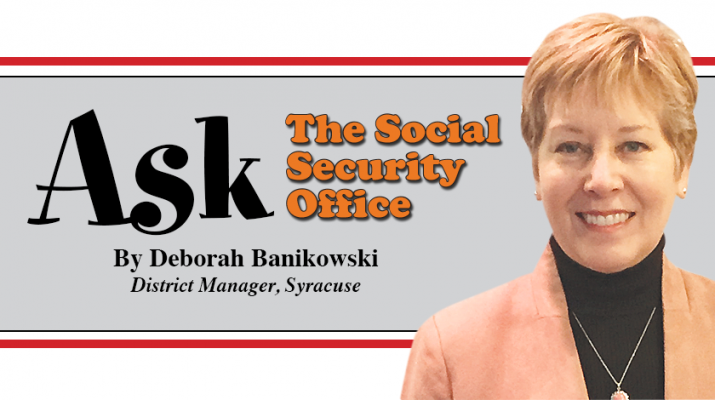It’s never been easier to do business with us online. Often there is no need to call or visit an office. Here are three webpages that can make your life easier:
• Create Your Personal my Social Security Account. Did you know you already have access to much of your Social Security information? All you need to do is create or sign in to your personal my Social Security account. You can verify your earnings, get future benefit estimates, instantly get a benefit verification letter, and more, with your own personal my Social Security account, at www.ssa.gov/myaccount.
• File for Your Retirement Online. Planning for retirement? Or looking to retire now? You can complete and submit your online application for retirement benefits in as little as 15 minutes at www.ssa.gov/retirement.
• Stay Informed! Our blog is the place to be for Social Security news. We feature messages and information direct from our acting commissioner and other experts. When you subscribe, you’ll get an email each time we post a new blog so you can stay informed. Visit blog.ssa.gov.
Our online resources don’t end there. If you didn’t see what you need in the list above, visit us at www.ssa.gov/onlineservices. Please share these pages with your friends and family.
• Servicing office location.
• Scheduled hearing date and time,
if applicable.
• Publications of interest, depending on the claim and current step in the process.
Use your personal “my Social Security” account to instantly check the status of your application or appeal at www.ssa.gov/myaccount.
If you have questions about retirement, disability, Medicare, or survivor’s benefits, as well as Supplemental Security Income, visit our webpage at www.ssa.gov/benefits.
Q&A
Q. Do Members of Congress have to pay into Social Security?
A. Yes, they do. Members of Congress, the president and vice president, federal judges and most political appointees have paid taxes into the Social Security program since January 1984. They pay into the system just like everyone else, no matter how long they have been in office.
Q. I prefer reading by audio book. Does Social Security have audio publications?
A. Yes, we do. You can find them at www.ssa.gov/pubs. Some of the publications available include “What You Can Do Online,” “Working While Disabled — How We Can Help,” “Apply Online for Social Security Benefits” and “Your Social Security Card and Number.” You can listen now at www.ssa.gov/pubs.
Q. My spouse died recently and my neighbor said my children and I might be eligible for survivors benefits. Don’t I have to be retirement-age to receive benefits?
A. No. As a survivor, you can receive benefits at any age if you are caring for a child who is receiving Social Security benefits and who is under age 16. Your children are eligible for survivors benefits through Social Security up to age 19 if they are unmarried and attending elementary or secondary school full time. Keep in mind that you are still subject to the annual earnings limit if you are working. If you are not caring for minor children, you would need to wait until age 60 (age 50 if disabled) to collect survivors benefits. For more information about survivors benefits, read our publication Survivors Benefits at www.ssa.gov/pubs.
Q. I suspect that someone I know is collecting Social Security disability benefits when they shouldn’t be. What is the best way for me to report fraud?
A. You can report fraud online at www.oig.ssa.gov/report or call the Social Security Fraud Hotline at 1-800-269-0271. Social Security has zero tolerance for fraud and uses many proven tactics to prevent fraud, waste, and abuse. Our Office of the Inspector General is relentless in its pursuit of people who conceal work activity while receiving disability benefits. We investigate and seek prosecution for people who receive benefits for a child or children who aren’t under their care, or who fail to notify Social Security of the death of a beneficiary and continue to receive and cash checks of the deceased. We also depend on you to help stop fraud.

